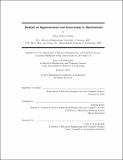Analysis of approximation and uncertainty in optimization
Author(s)
Mastin, Dana Andrew
DownloadFull printable version (1.931Mb)
Other Contributors
Massachusetts Institute of Technology. Department of Electrical Engineering and Computer Science.
Advisor
Patrick Jaillet.
Terms of use
Metadata
Show full item recordAbstract
We study a series of topics involving approximation algorithms and the presence of uncertain data in optimization. On the first theme of approximation, we derive performance bounds for rollout algorithms. Interpreted as an approximate dynamic programming algorithm, a rollout algorithm estimates the value-to-go at each decision stage by simulating future events while following a heuristic policy, referred to as the base policy. We provide a probabilistic analysis of knapsack problems, proving that rollout algorithms perform significantly better than their base policies. Next, we study the average performance of greedy algorithms for online matching on random graphs. In online matching problems, vertices arrive sequentially and reveal their neighboring edges. Vertices may be matched upon arrival and matches are irrevocable. We determine asymptotic matching sizes obtained by a variety of greedy algorithms on random graphs, both for bipartite and non-bipartite graphs. Moving to the second theme of uncertainty, we analyze losses resulting from uncertain transition probabilities in Markov decision processes. We assume that policies are computed using exact dynamic programming with estimated transition probabilities, but the system evolves according to dierent, true transition probabilities. Given a bound on the total variation error of estimated transition probability distributions, we derive a general tight upper bound on the loss of expected total reward. Finally, we consider a randomized model for minmax regret in combinatorial optimization under cost uncertainty. This problem can be viewed as a zero-sum game played between an optimizing player and an adversary, where the optimizing player selects a solution and the adversary selects costs with the intention of maximizing the regret of the player. We analyze a model where the optimizing player selects a probability distribution over solutions and the adversary selects costs with knowledge of the player's distribution. We show that under this randomized model, the minmax regret version of any polynomial solvable combinatorial problem is polynomial solvable, both for interval and discrete scenario representations of uncertainty.
Description
Thesis: Ph. D., Massachusetts Institute of Technology, Department of Electrical Engineering and Computer Science, 2015. This electronic version was submitted by the student author. The certified thesis is available in the Institute Archives and Special Collections. Cataloged from student-submitted PDF version of thesis. Includes bibliographical references (pages 249-260).
Date issued
2015Department
Massachusetts Institute of Technology. Department of Electrical Engineering and Computer SciencePublisher
Massachusetts Institute of Technology
Keywords
Electrical Engineering and Computer Science.